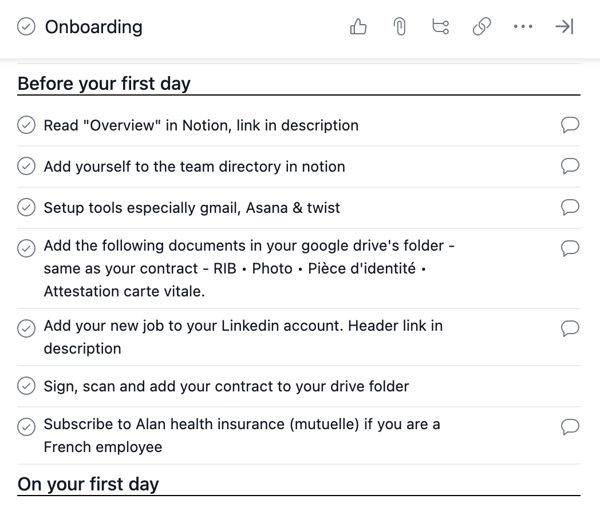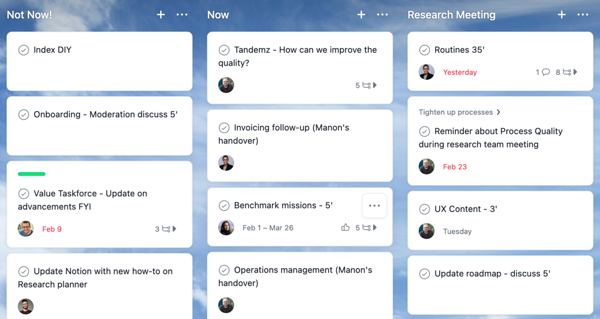March 3, 2021
Managing your team while working remotely
Getting a team to give its best is not simple even in the office. It is even more complex when everyone is at a distance, often by necessity.
The good news, in my opinion, is that remote working does not actually create new challenges, it only exacerbates existing ones. As a manager, you will have already handled them!
After our advice on how to foster team cohesion while working remotely, I would like to share some tips on how to manage a mostly remote working team, based on our experience. An anecdote to illustrate this: we have a team of 20 people and yet our Paris office has only 4 workstations!
Always keep your virtual office door open
In my humble opinion, my most valuable and simple feedback... Why? From a distance, it's very easy to miss what's going on in the team: who's doing well, who's doing poorly, how good the relationships are, what rumors are circulating, etc. Some of what you knew how to pick up on from non-verbal clues will have vanished. However, if you manage to install a clarity culture, and to remind people that you are available and kind, there will be people who will come to you to point out where things are not working, or discuss their questions with you.
Management activities in their current form
Recruiting and especially onboarding new arrivals remotely
Remote recruitment is now widely used. Also, I would like to emphasize the onboarding of new arrivals. It's hard enough to arrive in a new office without the right hardware or software. Working remotely, if no one is there to greet you and see what you need to get to work, it gets discouraging fast. The solution is twofold:
- anticipate: send everything required to the new arrival so that they are operational from day one.
- energize: make their first day an event, with a virtual coffee break, and invitations to as many meetings as possible to get a sense of the team's dynamics.
At Ferpection, we manage these activities like any other project and improve them with feedback from newcomers 3 weeks after their arrival, via a surprise report:
A word about monitoring
I won't lie to you. If you can't imagine managing without monitoring schedules or proofreading every presentation, you are going to suffer in a remote working environment. Perhaps this is a good opportunity to try to let go? After all, who would blame you for not having monitored the activities and schedules of every member of your team in this kind of situation?
Don't let conflicts arise
Is this really remote working specific advice? Probably not, but distance doesn't help when you can't put two people in the same room or send them to lunch together. For our part, we have put in place a conflict resolution process that I am happy to share with you, in English as is all our documentation.
Vacations
A positive point to end this part on! At a distance, it certainly is necessary to invest more energy in interpersonal relationships. This positive energy doesn't come from nowhere. Breaks, vacations, time off and extended weekends can help your team members recharge their batteries and come back in the best possible shape. Beyond the workload, accepting or even encouraging these breaks can be a lifesaver!
Communication
Accept asynchronous discussion
Although the written and the spoken word each have their virtues, the quality of discussion is very often spoiled by an inordinate expectation of instantaneous response. You have just sent your colleague an email or a question by instant messaging, how come he hasn't answered you within 5 minutes?
Probably because he is focused on a task and will respond to you in a timely manner. It is up to us managers to create a climate of trust with regard to the benefits of asynchronous communications. There may also be emergency situations. Email and instant messaging are not the right medium in that case. A call or a text message is often a much better way to get attention.
Tools, useful or tyrannical?
Finally, a word about tools. There are many tools that let you know who is online or actively replying to you. These are addictive mechanisms that excel at capturing your attention but actually harm your concentration. At Ferpection, we have chosen:
- to turn off all notifications from all tools to promote concentration.
- to communicate in writing via Twist, a competitor to Slack that is totally asynchronous. You can't see who is online or even if the person has read your message!
Generating positive energy in meetings
Ah... meetings! Delays, multi-tasking, lack of decision-making... I have good news for you: whether in large or small organizations, "remote working" has enabled me to get it straight every time. Widespread remote working is an opportunity for people to arrive on time, listen to each other, pay attention, avoid asides and leave with clear decisions and actions.
By leading by example, of course, you'll make meetings productive again. These discussions will become one of the main team moments, an opportunity to seize for you and your teams! In the illustration below, you can see how we mix meeting agendas and project management in the same medium for more practical handling:
Minutes are marvelous
Yes, it may sound strange... but in a context where you can't check if messages are being properly understood, developing a formality culture can save you a lot of time and energy. This is based on:
- an investment in writing, less but better: announcements, preparatory notes, minutes, etc.
- and encouraging the systematic reading of these notes.
So how do we ensure that these texts are read, for example? I am particularly fond of preparatory notes. I ask each subject owner to send these notes and during the discussions, we do not refer to the note. This is a discussion, so everyone is required to read the note if they wish to participate.
Write and then call each other!
It's a fine balance. The concern here is that you can't just get up and go see your colleagues or chat with them more informally over lunch. On the other hand, it's not as if the various members of your team will be calling each other 10 times a day about the slightest thing.
The written word therefore makes sense as it allows a certain number of messages and questions to be passed on as they arise. On the other hand, we all know that the written word quickly generates misunderstandings. More than ever, remember the "pick up the phone after 3 written exchanges" rule.
Performance: are we chickens?
To find out, I invite you to watch this inspiring video by Margaret Heffernan on individual and team performance:
And what better way to end this article than to put the subject of remote working in perspective with this idea of performance?
- Managerial performance: as a manager, your role is first to build a team, to retain and grow the individuals within it. Do you feel that you will lose people because of the distance? How can you stop it? This is the time to build progress plans with your teams, an exercise that ultimately is not so different when remote working.
- Team performance: are your employees accomplishing their remote goals better, worse or at the same level as before? If this performance has changed, the "remote" dimension may indeed provide a basis for discussion, but it should not be at the center of it.
We often hear people who experiment with remote working explain that they were able to work better, and more focused than they had been. With a little adaptation, there is every reason to believe that your team can perform even better in these conditions. Ultimately, remote working could be a catalyst for you. This is an environment where we need to communicate better and rework the basics to free up time for more human interaction.
All articles from the category: Culture | RSS



